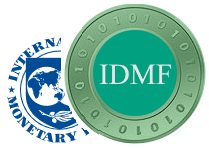Why the International Monetary Fund is in a hurry to become the International Digital Monetary Fund
Hector McNeill1
SEEL
 Recent announcements by the presidents of the International Monetary Fund and the World Bank are tacit admissions that the Bretton Wood's set up has lost it relevance. This is because of a loss of control by central banks and government policy instruments in assisting the world economy secure the needed maintenance of a balanced distribution of real incomes and a sustained carrying-capacity of the world. Recent announcements by the presidents of the International Monetary Fund and the World Bank are tacit admissions that the Bretton Wood's set up has lost it relevance. This is because of a loss of control by central banks and government policy instruments in assisting the world economy secure the needed maintenance of a balanced distribution of real incomes and a sustained carrying-capacity of the world.
The timing of this announcement described as the "Bretton Wools moment" takes advantage of the state of affairs created by the Covid-19 crisis to finally admit Breton Woods has failed. It failed a long time ago when Nixon took the USA off the Gold Standard almost 50 years ago.
This public relations event marks the beginning of a broader initiative to attempt to reinstate USA financial hegemony just as it seems to be losing this. |
Nixon's decision to come off the Gold standard was related to his trying to prevent the USA paying its international obligations under Bretton Woods to maintain convertibility of between the US dollar and Gold. Since the US was beginning to operate beyond its means and could not meet this obligation, Nixon closed the Gold "window". Since then the USA has not brought its printing of the dollar into line with its endogenous money volume requirements but rather has simply expanded dollar releases and continued to live beyond its means resulting in worldwide debt, based on the dollar, reaching untenable levels. Following the international petroleum price crises and ensuing slumpflation, starting around 1975, the US administrations relaxed sensible financial regulations which maintained a lid on financialization. The IMF and the World Bank went along with this expansion with many critical decisions becoming increasingly subject to US State Department agreement.
As a result the ability of many countries to develop appropriate macroeconomic and development policies for their specific needs became highly compromised by a top down international Bretton Woods strategy supporting growth based on dollar debt, a key plank of the US State Department mandate. The Federal Reserve and national central banks jealously guarding their "independence", ably prevented the democratic process of public choice to have any say in the direction or methods applied to drive this expansionary monetary policy.
The real motivationUnder quantitative easing (QE), initiated over a decade ago following the 2008 financial crisis, the wrong models applied to monetary policy justifications, such as the QTM, resulted in a serious misdirection of monetary policy leading to a further depression of the real economy as a result of diversion of monetary expansion into asset price speculation. This massive error is explained in the
Real Money Theory identity. This model was applied by all central banks with the IMF and the World Bank having nothing to say about the flawed model, or of its likely outcomes. In spite of the poor outcomes for QE in Japan who had experimented with this as far back as the mid-1980s it was only in 2014 that the IMF in its October, 2014, "Global Financial Stability Report", admitted that QE encouraged speculation (See,
"IMF confirms that monetary policy is an incentive for speculation"). Mervyn King the ex-governor of the Bank of England had also admitted that QE favoured the banks and assets holders as opposed to the real economy and wage earners. Therefore for the last six years the IMF has been aware that this is a failed system but it is only now that it is felt that it is time to do something about it.
Two developments are encouraging the State Department to goad the IMF and World Bank into some sort of action.


These are BitCoin and Digital exchange currencies. Both of these developments bypass banks and central banks. The State Department's concern is to avoid a loss of control over global financial matters since this has been a cornerstone of US hegemony and its ability to influence which countries are supported, and in which way, as well as to impose sanctions and to finance wars.
Recently there has been a rising interest in BitCoin holdings by larger investment companies who have become increasingly concerned at the declining real value of the dollar linked to QE and now the purchase of corporate assets and even, indirectly, shares by the Federal Reserve in a Sovietization of the economy. The free market is not supporting many companies whose share quotations do not reflect their prospects but simply that QE has enabled companies to purchase their own shares to drive up prices. As a result, the stock markets have had a declining role in providing any indication of economy performance in spite of the fact politicians point to the speculative rise in share prices as a sign of a "healthy economy". The proportion of populations holding shares is declining.
As the economies slide towards falling real investment and market demand depression as a result of falling real incomes, Covid-19's arrival has exacerbated an already poor state of affairs. Several countries are considering the idea of digital exchange currencies which bypass banks but provide unemployed with a means of exchange for the purchase of specific items such as food. How this can be managed in a practical manner, without raising debt through private banks, can be explained by the real incomes approach to economics. SEEL has recently completed a review of these methods and these will be posted on this site. China has already launched tests of such systems for general consumer support on a reduced scale. China's world leading capabilities in digital systems and mobile technologies will result in a very rapid take up of any established system following these experiments. Therefore, before these moves alert populations as to the marginal future requirements for banks, an underlying objective of the "Bretton Woods moment" is interpreted by some to be a move to regain control over global monetary affairs by launching an international digital currency over which the IMF would have total oversight and control.
During the original Bretton Woods negotiations there was an intense rivalry between the UK and the USA. The USA refused to accept John Maynard Keynes' far better proposal for the Bancor, an international currency which he developed with Ernst Schumacher. Instead, "pressure" resulted in the acceptance of the dollar-centric system overseen by the IMF and World Bank. As predicted by Robert Triffin, the dollar, as a national currency was unsuitable as an international reserve currency because of the benefits to the country concerned as well as the practical difficulties of managing domestic needs with the needs for the reserve currency of other countries. This coordination gap has been "managed" by the increasing levels of interference by the State Department in the affairs of other countries and the declining image of US foreign policy.
Just as the original Bretton Woods called upon the desire for a better world order, these latest appeals are an attempt to repeat this "Bretton Woods moment". The president of the IMF called attention to Keynes' hopes for the world. She set out some imperatives for change including a desire for better economic policies, supporting people, their health and equality, assisting the young and increasing internet access and, of course, a green new deal for sustainability.
The 2019 Sustainable Development Report reported that there is a negative correlation between economic growth and income disparity, sustainability and climate change. The Agenda 2030 portfolio of projects supporting 17 Sustainable Development Goals is failing. Thorstein Veblen warned of
the dangers of financialization in 1921 and observed that institutions are shaped by the conditions of the past and therefore are never in tune with the needs of the present. The Breton Woods framework collapsed in 1971 and the failure to change then resulted in the same institutions, the IMF and the World Bank, trying to manage the fiat currency financialization process which only spread the damage, which Nixon thought he had resolved for the USA, to the rest of the world.
1 Hector McNeill is the Director of SEEL-Systems Engineering Economics Lab.
All content on this site is subject to Copyright
All copyright is held by © Hector Wetherell McNeill (1975-2020) unless otherwise indicated